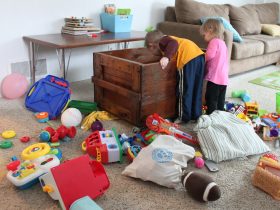All children lie at some point—whether it’s a small fib (“I brushed my teeth!”) or a more elaborate story (“The dog ate my homework!”). While lying can be frustrating for parents, it’s often a normal part of child development. The key is understanding why kids lie and how to respond in a way that encourages honesty without damaging trust.
Why Kids Lie
Children lie for different reasons depending on their age, personality, and circumstances. Understanding these motivations helps parents respond appropriately.
A. Developmental Stages of Lying
-
Toddlers (2-4 years): May tell fantasy-based lies (e.g., “I saw a dragon!”) because they don’t fully grasp reality vs. imagination.
-
Young Kids (5-8 years): Often lie to avoid punishment (“I didn’t break the vase!”) or get something they want (“My mom said I can have candy!”).
-
Tweens & Teens (9+ years): Lies become more sophisticated—to protect privacy, fit in socially, or avoid disappointing parents.
B. Common Reasons Kids Lie
-
Fear of Punishment – If a child expects harsh consequences, they’re more likely to lie.
-
Desire for Approval – They might exaggerate achievements to impress parents or peers.
-
Testing Boundaries – Some kids lie just to see what they can get away with.
-
Avoiding Embarrassment – Older kids may lie to cover up mistakes or insecurities.
-
Protecting Someone Else – They might lie to shield a sibling or friend from trouble.
Expert Insight:
“Lying is a sign that a child understands social rules and is trying to navigate them—not necessarily a moral failure.”
— Dr. Victoria Talwar, Child Psychologist & Author of “The Truth About Lying”
What Parents Can Do About Lying
Reacting calmly and constructively is crucial. Here’s how to handle lies effectively:
A. Stay Calm and Avoid Overreacting
-
Instead of: “You’re such a liar! Go to your room!”
-
Try: “I can see you’re worried about telling me what happened. Let’s talk about it.”
B. Focus on the Behavior, Not the Lie
-
Example: If a child denies drawing on the wall, say:
“I know it’s hard to admit mistakes, but we need to clean this up together.”
C. Praise Honesty More Than Punishing Lies
-
When your child tells the truth (even if it’s about something bad), acknowledge it:
“I really appreciate you being honest with me. That takes courage.”
D. Use Natural Consequences
-
If a teen lies about finishing homework, let them face the teacher’s response rather than adding extra punishment.
E. Problem-Solve Together
-
Ask: “What could you do next time instead of lying?”
-
Help them brainstorm better solutions.
Ways to Help Your Kids Avoid Lying in the First Place
Preventing lying is easier than correcting it. Try these strategies:
A. Model Honesty
-
Kids imitate parents. If they hear you tell “white lies” (e.g., “Tell them I’m not home!”), they learn lying is okay.
B. Create a Safe Space for Truth-Telling
-
Let your child know: “You won’t get in trouble for telling me the truth.”
-
If they confess to breaking something, thank them instead of yelling.
C. Reduce Temptations to Lie
-
Instead of asking, “Did you eat the cookies?” (which invites a lie), say:
“I see the cookies are gone. Next time, let’s ask first.”
D. Teach Alternative Strategies
-
Role-play scenarios: “If your friend wants you to lie about where you’re going, what could you say instead?”
What Parents Shouldn’t Do
Some reactions accidentally encourage more lying:
❌ Trap Them in a Lie
-
Avoid: “I know you didn’t study—tell me the truth!”
-
Why? It puts them on the defensive.
❌ Label Them as “Liars”
-
Avoid: “You always lie!”
-
Why? Kids internalize labels and may think, “Why bother being honest?”
❌ Over-Punish Small Lies
-
Avoid: Grounding them for a month over a fib.
-
Why? Harsh punishments make kids better liars, not more honest.
❌ Ignore the Root Cause
-
If lying is frequent, ask: Is my child scared of my reaction? Seeking attention? Struggling with peer pressure?
Conclusion: Building a Culture of Honesty
Lying is a normal part of growing up, but parents can guide kids toward truthfulness by:
✔ Understanding why they lie (fear, shame, or testing limits)
✔ Responding with patience (focus on solutions, not shame)
✔ Encouraging honesty (praise truth-telling, even when it’s hard)
✔ Avoiding common mistakes (like labeling or over-punishing)
Final Thought:
“The goal isn’t to raise a child who never lies—but one who chooses honesty because they trust you’ll listen.”
By fostering open communication, you help your child develop integrity—not out of fear, but because it’s the right thing to do.














Leave a Reply
View Comments